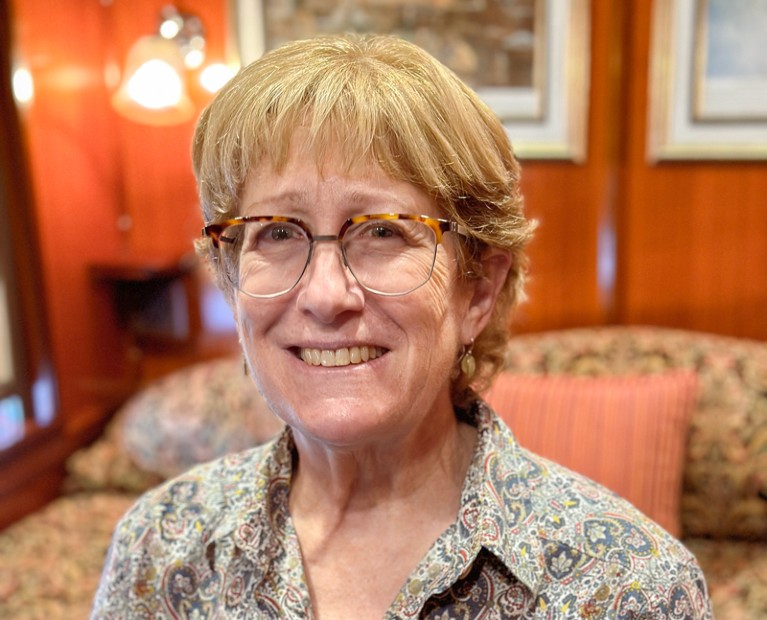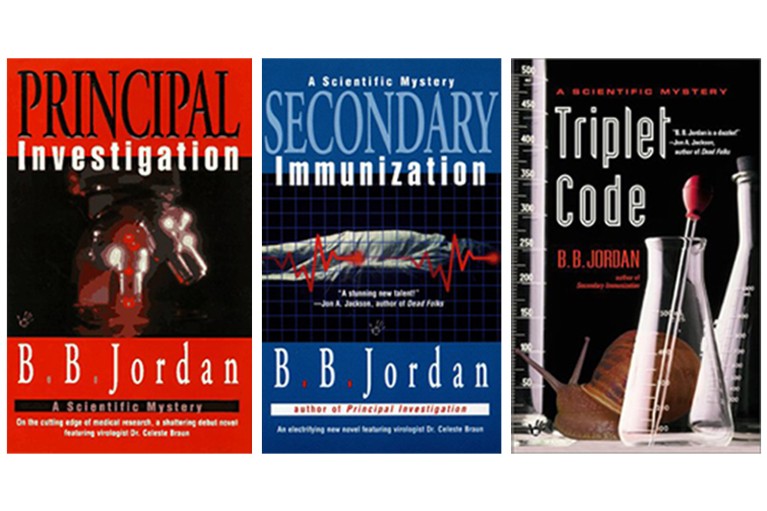
Frances Brodsky is a scientist and an author.Credit: Peter Parham
Frances Brodsky is a cell biologist at University College London (UCL) and co-founder of Traffic, a journal of intracellular transport. She is also the author of three mystery novels set in the world of bench science, written under the pseudonym B. B. Jordan. The series features Dr Celeste Braun, a virologist in San Francisco, California, who uses her scientific expertise to solve mysteries and fight crime.
Earlier this year, Brodsky was a judge for a science-fiction short-story contest sponsored by Nature and EU-LIFE, an alliance of European research institutes.
What does your research involve?
My focus is a protein called clathrin, which is involved in many intracellular trafficking pathways. My lab discovered1 that a second form of clathrin in humans is specialized for trafficking the GLUT4 glucose transporter to an insulin-sensitive storage compartment in the cell. This pathway is dysfunctional in type 2 diabetes.
It’s exciting to translate our basic biochemical and cell biology work into things that are related to physiology. Both forms of clathrin have very important physiological roles, and studying them has led to some interesting insights into the workings of bodily processes.
What inspired you to write fiction?
In the late 1980s and early 1990s, films like Jurassic Park or Back to the Future were coming out, continuing a Hollywood trend of presenting negative or ‘wacky’ ideas of what science and scientists are like. I felt that it would be interesting to show how human science is, the problems that scientists confront and what our world is like.
Training: Narrative tools for researchers
Also, I love reading fiction, particularly murder mysteries, because they reveal things about different worlds. My all-time favourite mystery author is P. D. James, who wrote the Adam Dalgleish series. I’m currently immersed in a series about London featuring investigators Bryant and May, by Christopher Fowler. Murder mysteries are relatively easy to construct, because they have a formula. When I started writing, I felt I could use that medium to communicate about the world of bench science.
Where do your novels fit in the context of your career?
Early in my professional life, I decided that if I was going to write, it would be good to do it on my first sabbatical after getting tenure, because that whole first part of your career is really focused on getting your research published and funded and getting yourself established.
I got tenure as an associate professor in 1991 and took my first sabbatical year in 1993. That’s when I started writing my first novel, Principal Investigation, which is about a criminal who holds the world hostage through a deadly virus. It was published in 1997, and I got a contract for two more books. In Secondary Immunization, published two years later, Dr Celeste Braun gets drawn into investigating a criminal network. My third novel, Triplet Code, appeared in 2001 and begins with the mysterious deaths of three of Dr Braun’s colleagues, which she suspects are linked to her.

The Celeste Braun books are mystery novels set in a laboratory.Credit: Berkley, Prime Crime
That year, my publisher asked me to get a fourth book ready, which I did not quite manage. By then, I was involved in running the journal Traffic, which I had co-founded the year before. It was quite time-consuming and took my energy away from fiction. I enjoyed working with Traffic for about 20 years, while also continuing my scientific research.
I think I characterize myself as a serial ‘project person’. Almost ten years ago, I moved from the University of California, San Francisco, to London to work as director of the Division of Biosciences at UCL, continuing my lab and taking on leadership in the community.
How much of you is in Celeste Braun?
Fiction generally stems from personal experience or thorough research. I am definitely not Celeste Braun. Among our many differences is the fact she is a virologist; I was working on cell biology related to immunology around the time I wrote Braun into existence.
Collection: Science communication
Her academic experiences are based on my experience of the academic world, but nothing about her personal life is carried over. My characters are fabricated by mixing and matching elements of real people, not necessarily from the academic world but also from observing colleagues in various situations.
How has writing fiction influenced or inspired you as a scientist?
Scientists become writers by necessity, for academic manuscripts and grant applications. Fiction helped me to appreciate how important it is to consider your audience, and that has had a huge influence on my scientific writing. When you’re writing fiction, you’re addressing the public audience in a certain way. When you’re writing a scientific manuscript, you’re addressing your peer audience in a certain way. And when you’re writing a grant application, you’re addressing them in a different way — there are many ways to tell stories and convey ideas.
What advice would you give writers who would like to tell stories about science?
For non-scientist writers, it’s really important to try to understand where the concepts come from and the world in which science is produced. It’s important to interact with experts; I think it’s difficult to write about science without some kind of contact with this world. University publicity departments usually have a good network to identify scientists who can speak lucidly about their work.
For scientists in general, it’s really important to develop communication skills. It helps to be writing regularly — keeping a diary, or writing essays or even poems, just for your own practice, and to learn about using words in different ways. The main advice I would give is to think about who you’re talking to and consider how to explain the concepts you are working with. The average reader doesn’t have a lot of background in your field.
I would say that writing for the public in general, whether it’s fiction or non-fiction, is a similar exercise. The really pleasurable thing about writing fiction is that you can invent stories. Your imagination can run wild, whereas if you’re trying to explain science to the public, you’re limited by reality and professional distance. Fiction can communicate about real science, even when the characters and their interactions are obviously imagined.
Is there more fiction writing in your future?
I would like to think so, but at the moment I’m still busy with academic projects in London. It would be an interesting challenge to return to fiction writing in the future, but I’m not sure if Celeste Braun would resurface to finish her battle for tenure.

 Novelist Cormac McCarthy’s tips on how to write a great science paper
Novelist Cormac McCarthy’s tips on how to write a great science paper
 What scientists can expect when dabbling in science writing
What scientists can expect when dabbling in science writing
 Scientific utopias: scientific enlightenment in the Stupid Questions Office
Scientific utopias: scientific enlightenment in the Stupid Questions Office






